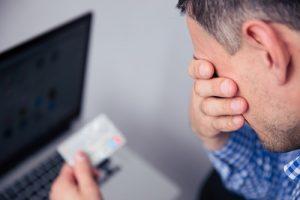- Free Consultation: 916 459 2364 Tap to Call
Credit Card Debt in Chapter 13 Bankruptcy

Credit card debt is one of the most prolific types of consumer debt in California. In fact, the total credit card debt in 2018 for Americans exceeded $1 trillion. For the first time in history, this equates to an average household credit card debt figure of over $8,600. As such, individuals commonly approach a California bankruptcy attorney to discover if Chapter 13 bankruptcy can help them with troublesome credit card debt. Chapter 13 bankruptcy, or “reorganization bankruptcy” allows an individual to establish a repayment plan while eliminating or discharging any remaining amount at the end of that repayment plan. A Chapter 13 discharge can be quite helpful in dealing with excessive credit card debt.
How Credit Card Debt is Prioritized
Chapter 13 bankruptcy is helpful in eliminating credit card debt because of its ability to reduced unsecured debt within the US Bankruptcy Courts. When you file for bankruptcy in California, the bankruptcy trustee divides up your debt into three different debt classifications called priority debt, secured debt, and unsecured debt. This is the actual order that you must pay your debt, with priority debt and secured debt repayment being required. You pay back unsecured debt last but only if you can still afford to do so. Credit card debt falls into the category of unsecured debts, although some credit card companies can and will create credit agreements which are secured. For this reason, read your original credit card agreement to ensure that it is, in fact, an unsecured agreement.
How Much Credit Card Debt is Paid Back
How much credit card debt you will have to pay back in Chapter 13 bankruptcy depends on how much money you earn before and during your Chapter 13 repayment period. Your credit card debt repayment amount is also contingent on the amount of priority debt and secured debt you owe. To calculate how much of the credit card debt you will be liable for in Chapter 13 bankruptcy, look at your overall budget. Consider how much you can afford to pay based on income and expenses and deduct the amount of priority debt and secured debt that you intend to pay in the future. Any money left over from your Chapter 13 repayment amount goes toward paying back your unsecured debts. The balance between this amount and your credit card debt is discharged at the successful conclusion of your California bankruptcy.
Avoiding Lawsuits
Creditors have the right to file a lawsuit against consumers to force them to repay a debt by obtaining a judgment in a civil court. If you are currently being sued over a credit card balance, time is of the essence. Filing bankruptcy offers a consumer an automatic stay which can stop a credit card debt lawsuit in its tracks, but it is much easier to discharge this debt using bankruptcy than it is to clear up a lien on your property because of a judgment. Contact a Sacramento bankruptcy attorney if you have received a summons to court because of credit card debt to avoid further adverse actions.











